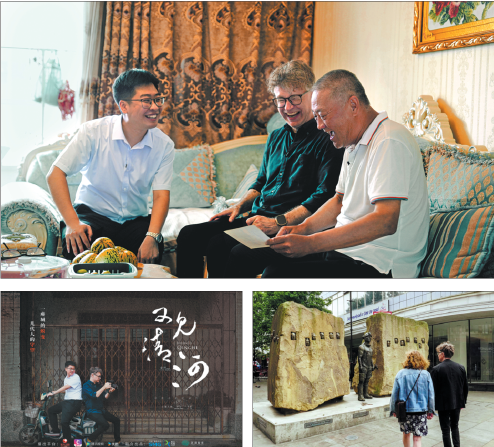An empowering tale of two grids
Documentary shows how China and UK, despite the geographical distance, faced and overcame similar energy transition challenges, Zheng Zheng reports in Shanghai.

When British documentary director Arthur Jones returned to the Qinghe Power Plant in China's Liaoning province last year, he witnessed a transformation that exceeded his expectations from his last visit in 2021.
During that winter of 2021, while finishing his documentary about the plant, Jones, made a promise: "If this plant survives, I will return." This simple pledge has now materialized into a new documentary that parallels the industrial transformations of China and the United Kingdom.
Return to Qinghe, a 30-minute Sino-British coproduction featured as a continuation of the stories from China on the Move Season 2, weaves together the story of Li Jia, a 29-year-old power plant employee in northeastern China, with Jones' own family history in Yorkshire, England's industrial heartland. The documentary, produced by Jones, 52, explores how two communities, despite their geographical distance, share similar experiences in navigating energy transition challenges.
The project took shape when Li's lecture at a speech competition accounting the transformation of the power plant, My Appointment with Arthur Jones, reached both Jones and the documentary's Chinese director, Jin Dan. Li's account of the plant's progress toward clean energy drew Jones back to Qinghe.
"I've been interested in environmental issues since my teens," says Jones, who has lived in China for over two decades. "When we first filmed at Qinghe, the plant was facing bankruptcy. Coming back in 2024, we found not just survival but transformation as wind turbines now dot the landscape where coal operations once dominated."
The parallel narratives emerged naturally from Jones' own background. "I grew up in South Yorkshire, surrounded by coal mines and power plants," he recalls. "I was about 8 or 9 when the miners' strike happened in the 1980s. The contexts differ — China's transition is purely environmental, while Britain's was marked by political conflict — these parallel experiences deserve comparison, not for judgment but for understanding."
The documentary delves into three generations of Li's family, from his grandfather's migration to Liaoning, his father's decades of service with the old energy system, to Li's own experience with the plant's clean energy transition. This generational narrative mirrors Jones' family history of migration from Scotland to England and Yorkshire's transformation.
"People often draw comparisons between different regions, but the shared experiences really matter as they help us recognize we're not entirely different," Jones reflects.
The human dimension of industrial transformation comes alive through unexpected encounters, according to Jones. During filming in Yorkshire, the director and his mother visited Paul, an old acquaintance and former dance teacher.
"Though not a miner himself, most of his students came from mining families," Jones shares. "He broke down while recalling the strike's final day, when workers returned to the pits, knowing it marked the beginning of the end for British coal mining. He even sang folk songs from that era. It was a deeply moving afternoon."
In Qinghe, the transformation carries its own emotional weight. While acknowledging the environmental toll of coal operations like blackened buildings and polluted air, the workers take deep pride in their profession.
"These workers maintain an incredible sense of unity and have tackled challenges collectively," Jones observes. "They take pride in the power plant's resurrection and express genuine love for their town.
"The speed of transformation over three years has been remarkable," Jones notes. "Looking at the landscape now, with traditional energy facilities surrounded by wind turbines like flowers, it's hard to tell whether you're in Britain or China. This visual similarity tells a universal story of industrial evolution."
"We deliberately chose personal narratives over broad policy discussions," Jin explains. "Major transitions ultimately come down to individual choices and experiences. These authentic personal stories often resonate more deeply."
The documentary, which premiered on June 3 on Shanghai-based Dragon TV, is available in both English and Chinese, with Jones providing Chinese narration for the first time. It is jointly produced by Shanghai Media Group's Docu-China Co and Lianhai Think Tank Hangzhou Co.
The episode follows up on stories from an earlier series about China's ecological governance. Future projects will explore ecological preservation at Poyang Lake and Hainan province's gibbon conservation, maintaining the dual-perspective approach to connecting environmental challenges across continents.
"We're in a middle ground," Jones says. "These aren't simple black-and-white situations. Our responsibility as documentarians is to faithfully record these transitions, showing how different communities face similar challenges, and how they find their way forward."

Today's Top News
- The farmer, the snake and Japan's memory hole
- Crossing a milestone in the journey called Sinology
- China-Russia media forum held in Beijing
- Where mobility will drive China and the West
- HK community strongly supports Lai's conviction
- Japan paying high price for PM's rhetoric






























